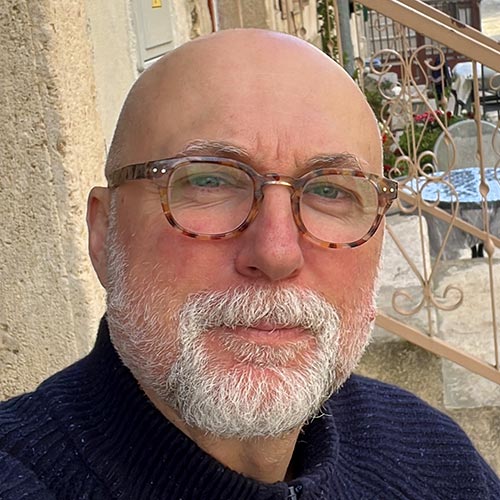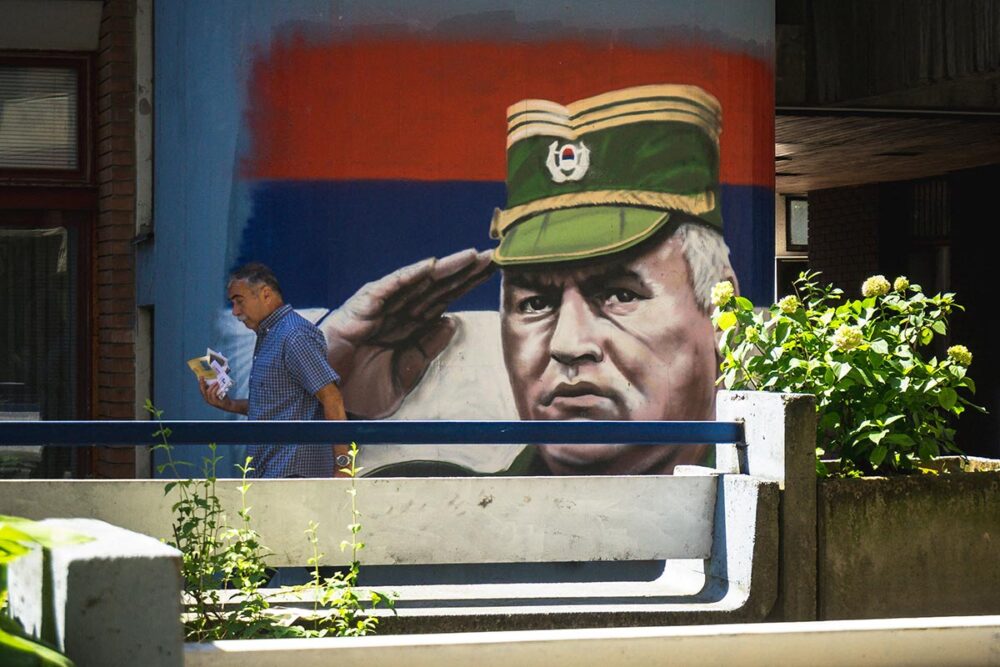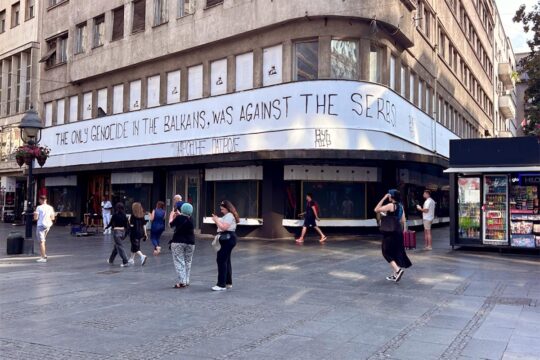In 2015, on the twentieth anniversary of the Srebrenica genocide, I wrote an essay forthewebsite Balkanist titled “No Reconciliation, We’re Still at War.” The piece was meant to be a warning: reconciliation in Bosnia and Herzegovina was failing, not because people didn’t want peace, but because the war had never ended. It had simply changed form, transforming the armed conflict into a battle over truth, memory, justice and recognition.
In the ten years which have passed since that text was published, the situation has not improved, it has become more dangerous. Although key perpetrators – like Ratko Mladić, the former commander of the Bosnian Serb Army – have been convicted and sentenced, and the facts about the crime have been established beyond reasonable doubt by international and domestic courts, the denial of the Srebrenica genocide is intensifying. And it is no longer a fringe effort or a subtle distortion of facts. In Serbia and Republika Srpska, the Bosnian Serb-dominated entity in Bosnia and Herzegovina, it has hardened into official state policy, with devastating consequences for justice and peace in Bosnia, but also in the whole region and its future.
This denial, rooted in nationalist ideology originally championed by the regime of Slobodan Milošević, is now amplified by geopolitical alliances with regimes that actively undermine international law. It is sustained by the failures of domestic leadership in Bosnia and tolerated – if not enabled – by the international community that increasingly applies justice selectively. Together, these forces have made space for a new generation to be raised on historical falsehoods and prepared, psychologically and politically, for renewed conflict.
Genocide denial is now state doctrine
In both Serbia and Republika Srpska, genocide denial has evolved into a cornerstone of governance. Serbian president Aleksandar Vučić continues to reject courts’ rulings, meaning the International Criminal Tribunal for the former Yugoslavia (ICTY) and the International Court of Justice (ICJ) that classified the 1995 mass killings in Srebrenica as genocide. Rather than using his influence to foster a reckoning with the past, Vučić has taken every opportunity to frame the genocide recognition as an attack on Serbs and Serbia.
His efforts to derail the May 2024 UN General Assembly resolution that established July 11 as the international day of remembrance for the Srebrenica genocide were not symbolic: they were aggressive, calculated and extensive. Serbia’s diplomatic apparatus was mobilized to lobby dozens of countries against the resolution. This was not about semantics. It was about asserting a narrative in which genocide is denied, victims are delegitimized, and perpetrators are defended.
In Republika Srpska, President Milorad Dodik has pushed this strategy further still. Over the past decade, he has openly glorified war criminals, repealed official acknowledgements of the genocide, and embedded denial into the education system. School curricula omit any mention of Srebrenica as a genocide, and students are taught to view ICTY verdicts as anti-Serb propaganda. War criminals like Radovan Karadžić are celebrated, with dormitories and public spaces bearing their names. Dodik frames any attempt to discuss the genocide as an attack on Republika Srpska itself, using denial not just as historical revisionism, but as a political weapon.
The Greiff commission as a propaganda tool
A pivotal moment in Republika Srpska’s march toward official, institutionalized genocide denial came in 2019, when Milorad Dodik’s government established a so-called “Independent international commission for investigating the suffering of all peoples in the Srebrenica region between 1992 and 1995”. Despite its name, the commission was neither independent nor committed to the truth. It was chaired by Gideon Greiff, an Israeli historian and former consultant at Yad Vashem, whose prior credentials dealing with Holocaust memory were cynically weaponized to give the project an air of legitimacy.
The commission’s mandate was not to examine new facts or contribute to reconciliation. Its real objective was to nullify the findings of the earlier 2004 Republika Srpska Srebrenica Commission - a report that had acknowledged the killings of thousands of Bosniak men and boys and paved the way for some degree of institutional accountability within the entity. The 2004 report, though imperfect, had recognized the role of the Republika Srpska military and police in the crimes and had identified numerous mass graves and victims by name.
Under Dodik’s direction, the Greiff commission sought to erase those admissions. Its 2021 report downplayed the number of victims, cast doubt on the classification of genocide, and accused the ICTY of bias and fabrication. It made sweeping claims suggesting that the number of Bosniak deaths was inflated, that many were “combatants”, and that the international courts’ proceedings were politically motivated. The report leaned heavily on disputed or fringe sources, employed misleading statistical analysis, and ignored or dismissed overwhelming forensic and testimonial evidence presented during years of ICTY trials.
This was not a scholarly exercise. It was a propaganda tool, publicly financed with the intent of constructing an alternative narrative – one that painted the Bosniak victims as Islamic fundamentalist aggressors and framed the Serbs as unjustly vilified. It was used not only as justification of internal policies of denial and distortion, but also as diplomatic ammunition. Dodik distributed the report to international partners, including Russia, China, and a number of right-wing figures in the European Parliament, in an effort to challenge the international consensus on Srebrenica.
The Greiff report sparked widespread outrage among survivors, victims’ families, and international legal experts. The International Residual Mechanism for Criminal Tribunals (IRMCT), which succeeded the ICTY, reiterated that the genocide in Srebrenica was firmly established by numerous verdicts. Even the German government responded decisively, announcing in 2022 that Greiff was under investigation for his role in genocide denial and was no longer welcome in the country, and stripped of an award for Holocaust-related research – a notable rebuke, given Greiff’s long-standing associations with Holocaust memorial institutions.
Despite this, the damage was done. In Republika Srpska, the Greiff report became a state-sanctioned document, treated as authoritative, and used to justify the rejection of court rulings and the removal of genocide references from public discourse. It was incorporated into Republika Srpska Assembly resolutions, echoed in media, and integrated into the talking points of Republika Srpska officials at every level. It represents perhaps the clearest example of how denial has shifted from a defensive position to an offensive campaign – a deliberate rewriting of history by state power and dressed in the language of academic legitimacy.
The Greiff commission did not just distort the record. It attempted to erase the foundation of justice established by more than a decade of international trials, over 800 witness testimonies, and thousands of forensic identifications. And it sent a clear message: Republika Srpska will not only reject the findings of international law, it will build its own reality, no matter how grotesquely it contradicts the evidence.
Denial enabled locally and globally
Denial of the Srebrenica genocide in Serbia and Republika Srpska is now the official policy, but the local and global circumstances have also played a part. The Bosniak political leadership is not without responsibility in this regard, primarily for its handling of the request for a revision of the 2007 judgment of the International court of Justice (ICJ), which found that Serbia had failed to prevent the genocide in Srebrenica, but stopped short of declaring Serbia directly responsible.
A legal opportunity existed to bring forth new evidence, possibly including previously unavailable ICTY material that demonstrated deeper Serbian state involvement in the coordination, support and cover-up of the genocide. But the Bosniak leadership, caught in a web of internal political rivalries, corruption and lacking international legal strategy, failed to submit a valid request.
The revision process, spearheaded by the then Bosniak member of the Bosnia and Herzegovina Presidency, Bakir Izetbegović, was not even properly initiated. The ICJ dismissed the petition on procedural grounds, not on the merits, despite significant funds spent on various local and international legal experts allegedly working on the application. This failure sent a devastating signal - not only to survivors, who felt abandoned and were traumatised once again, but also to the perpetrators and their political successors: Serbia read it as a capitulation. The silence that followed was interpreted not as legal caution but as moral weakness.
This moment, this failure was a major turning point in all conversations about justice and the acknowledgement of Srebrenica genocide in Belgrade and Banja Luka, where officials immediately framed it as exoneration. It emboldened the Serbian government to begin treating denial not as a defensive position but as a national mandate. It became the foundation of its political ideology – and an exportable product to a new generation. The message was clear: there would be no further legal challenge on the international stage to examine Serbia’s role in the genocide. And in that vacuum, war criminals from Bosnia (both those under indictment and the convicted) were offered shelter in Serbia, thanks to laws on dual citizenship, while genocide denial took root more deeply and more boldly than ever before.
Justice is optional, depending on your alliances
At the same time, the global order has changed dramatically over the past decade, and not in favour of justice. When Bosnia attempted to revisit the ICJ judgment against Serbia, it faced not only internal dysfunction but a lack of international political support. That absence of will has only deepened in the wake of recent wars. The impunity enjoyed by Israel for its actions in Gaza and by Russia for its crimes in Ukraine sends a clear message: justice is optional, depending on your alliances.
States like the United States of America and Germany – who supported the UN resolution commemorating the Srebrenica genocide – shield Israel from accountability. This hypocrisy is not lost on Vučić and Dodik. They see it as license. And indeed, they have chosen their allies accordingly.
Dodik has tethered his political future to Moscow, parroting Russian propaganda, undermining Bosnian state institutions, and openly supporting Putin’s model of power. At the same time, Vučić has built bridges with Russia and Israel, cozying up to regimes where ethnic supremacy and occupation are normalized and, more importantly, protected by major powers.
When the Israeli ambassador in Belgrade stated that “what happened in Srebrenica was not genocide”, it was not a diplomatic blunder. It was a statement of intent, calibrated for political effect. Serbia and Republika Srpska are not outliers in this world, they are learning from it, mimicking its worst impulses.
The message is now global: if your strategic position is strong enough, you can act with impunity. For those denying the genocide in Bosnia, this has become a playbook. Russia supports Dodik’s destabilizing agenda. Israel legitimizes denial through diplomatic complicity. The United States and the European Union, while nominally supportive of justice for Srebrenica, have failed to apply the same standards of accountability elsewhere. The credibility of international justice is crumbling, and those invested in denial know it.
Srebrenica Memorial Centre: an isolated beacon
And yet, in the midst of this darkness, there are places where the truth still breathes. The Srebrenica Memorial Centre has emerged as a vital institution in preserving the historical record and disseminating it with clarity and moral force. Over the past decade, under difficult circumstances and with modest resources, the Centre has become a living archive of memory.
Its research department has published extensive reports on genocide denial, including annual overviews that document hundreds of denial incidents across the region. The Centre’s work with youth has fostered a generation of scholars, activists, and journalists committed to truth-telling. It has opened its doors to educators, diplomats, students, and filmmakers, creating a space of both mourning and learning.
Internationally, the Memorial Centre has become a respected voice in genocide prevention circles. Its exhibitions have travelled to major capitals. Its leadership has engaged with global institutions, including the United Nations, and contributed to building new frameworks for genocide education.
But the Centre’s reach has met a wall in Serbia and Republika Srpska. State-controlled media either ignore it or vilify it. Serbian school curricula exclude it entirely. In Republika Srpska, organized school visits are forbidden. Young Serbs are more likely to visit Disneyland than the Srebrenica Memorial. The space where dialogue should occur has been symbolically sealed off by those who control the physical and narrative space where the memorial is situated.
The future shaped by denial
Denial is not merely the final act of genocide – it is its continuation. It ensures the erasure of memory and legitimizes future violence. It is crystal clear to me now that Vučić and Dodik are not just rejecting the past, they are constructing a future built on grievance, fear and ethnic supremacy. Their politics of denial are inseparable from their broader authoritarian projects.
The consequences are most visible in Serbia and Republika Srpska’s youth. A generation is now coming of age with little to no knowledge of the truth. In schools, textbooks whitewash the crimes. In media, genocide is discussed as a “Western lie” or “political tool”. In public discourse, the emphasis is never on victims of Srebrenica but exclusively on the creation of a parallel reality in which perpetrators are heroes and history is rewritten.
Young people are not just uninformed, they are systematically indoctrinated. The banners with images of Mladić or the chant Nož, žica, Srebrenica (Knife, wire, Srebrenica) are no longer shocking in stadiums or on social media platforms; they are fully normalized. Genocide denial has become a feature of nationalist identity, and anyone who challenges it is labelled a traitor or foreign agent.
This is not merely tragic, it is dangerous. Denial is not passive. It prepares the ground for repetition. A society that does not recognize its crimes is one that remains vulnerable to repeating them. Reconciliation requires acknowledgment. Justice requires accountability. Peace requires truth. None of these are possible in Bosnia, considering the environment Serbia and Republika Srpska have cultivated. And unless the international community is willing to confront this – honestly and consistently – the institutions we rely on for justice will continue to wither.
We are witnessing not just a denial of genocide, but its legitimization through silence, distortion and alignment with a world where justice has no traction. Unless this is confronted by courts, by educators and by international institutions, it will metastasize. And in some ways, it already has. We must stop pretending that Vučić and Dodik are misunderstood nationalists. They are the custodians of an ideology that dehumanizes, that prepares for exclusion, and that, under the right conditions, will justify violence once again.
I know it is primarily up to us, Bosnians, to develop ways of confronting this destructive political strategy which weaponizes genocide denial. However, the international community, especially the European Union and other relevant organisations, which continue to tolerate Vučić’s actions as long as he delivers shells and ammunition to Ukraine, bear a great deal of responsibility for how things will pan out in the future in Bosnia.
Considering the direction of the world at present, I am afraid that if I am asked to write on the fortieth anniversary of the Srebrenica genocide, the article may have to deal not with reconciliation nor genocide denial, but with an infinitely more sinister reality.

Refik Hodžić is a writer, journalist, film-maker and justice activist from Prijedor, Bosnia and Herzegovina. He has worked for more than 25 years in the field of transitional justice, with a particular focus on the role of media and strategic communications.






